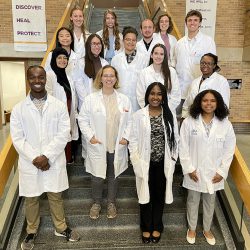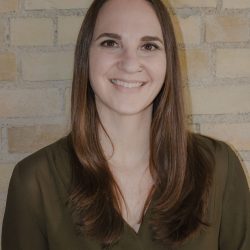How can veterinary medicine be more inclusive of individuals from populations that are underrepresented in the field? Three community members share their thoughts on this question in honor of Black History Month.
Dr. Stephan Carey, assistant professor in the Department of Small Animal Clinical Sciences

About: Stephan (Steve) Carey has spent his entire career as a veterinarian at Michigan State University. After obtaining his doctor of veterinary medicine (DVM) degree from the University of Wisconsin-Madison, he completed a rotating internship, residency in small animal internal medicine, and PhD in the Comparative Medicine and Integrative Biology program at the MSU College of Veterinary Medicine. He is currently an associate professor of health programs, and the associate chairperson of the Department of Small Animal Clinical Sciences. He is a faculty clinician with the Small Animal Internal Medicine Service, with a specialty interest in respiratory disease. His research program investigates mechanisms of environment-induced airway injury and remodeling.
How can the veterinary community be more inclusive of Black individuals?
"I believe that one of the biggest barriers to veterinary medicine for Black and other underrepresented minority groups (URM) is a lack of accurate awareness of veterinary medicine as a career option among K-12 learners—a high-esteem one at that. To that end, there have been many programs designed to provide exposure to and awareness of veterinary medicine to K-12 youth from underrepresented minority groups. However, for these youth outreach efforts to be effective, they need to be structured not only to engage URM students, but they also must educate their families, as parental opinion will heavily influence career choices among students in these communities. Longitudinal programs, like MSU GEAR UP, that provide early and sustained awareness and readiness support for both URM students and for their parents are essential if these early engagement efforts are to succeed.
I also believe that a barrier to the success of these programs is the public perception of veterinarians, particularly the portrayal of veterinarians in the media. Often, the representation of veterinarians in television, movies, journalism, and other media outlets not only fails to reflect diversity and inclusivity in the profession, it also undermines the rigor of the veterinary curriculum and the breadth and depth of career opportunities in veterinary medicine. This further alienates young Black learners and their families, as they aren’t exposed to the possibilities within veterinary medicine in a manner that’s accessible to them. If we are going to make meaningful connections with the Black community, it is important for Black veterinary professionals and allies to leverage opportunities to engage and better educate the public about ourselves and our profession."
Sierra McClain, DVM Class of 2023

About: "I'm a third-year DVM/PhD, MPH student at MSU. I was born in Detroit and raised in Ypsilanti, MI. I'm a first-generation college graduate and will be the first doctor in my family. I attended Eastern Michigan University for my undergrad and M.S. degrees, and I've been interested in wildlife since childhood and that interest grew further into a research-focused direction after receiving my M.S. So I'm also pursuing a PhD and MPH to explore research questions in focused on zoonotic diseases."
How can the veterinary community be more inclusive of Black individuals?
"Throughout my academic and work experience, I've noticed that the further up in my education I go, the less Black representation I see in professional fields. This is also true for the veterinary field. According to the U.S Bureau of Labor Statistics, less than one percent of veterinarians in the U.S. are Black as of 2019. However, pet ownership diversity is increasing exponentially.
Me personally, I did not encounter a Black veterinarian until I was in veterinary school. The veterinary community's inclusivity comes into play when we have better Black representation in the field, as well as increasing access and exposure. Black children living in urban or low-income areas aren't exposed to the field because of certain social determinants that make other livelihood necessities important over veterinary care. When you can't afford to put food on the table, or pay the electric bill, taking your dog to the vet can easily be considered a luxury. It's all too common in Black communities, so children aren't exposed to the field at a young age. My exposure came from TV shows like Crocodile Hunter, and David Attenborough documentaries throughout childhood.
There's also client culture, where clients blatantly refuse to have their pets seen by Black veterinarians, something I've experienced myself working as a veterinary assistant prior to school. Solving the issue of increasing diverse representation in the field of veterinary medicine is something that needs to happen for the field to grow. I hope to add to that representation myself, and provide an avenue for others like me that feel underrepresented in veterinary medicine."
Stephanie Smith-Edwards, Safety Manager at the College of Veterinary Medicine

About: Stephanie Edwards (MS) received her bachelor's and master's degrees from the Animal Science Program at Michigan State University. Most of Stephanie’s career has been with MSU; as an animal caretaker, a research technician, and now the Environmental Health and Safety Team. Stephanie’s job at the College of Veterinary Medicine is to protect veterinary personnel from environmental and animal hazards. This includes, but is not limited to: safety training and incident prevention, accident report investigation, respirator fit testing, radiation dosimetry program assistance, and anything else safety-related that may arise.
How can the veterinary community be more inclusive of Black individuals?
"I believe it is very important for everyone to be a part of an inclusive community. We all have to live, work, and relax in a diverse environment; this enriches everyone’s lives in ways we sometimes take for granted. I remember going through the Animal Science Program at MSU and being the only African American female in my graduating class. I had struggles of feeling alone in many of my classes; these feelings have inspired me to become a resource in the animal health profession. Being a black woman, I know the importance of seeing a reflection of yourself in the work community you are a part of. I feel proud when someone looks at me doing my job and aspires to do the same. It is important for me to be a person to provide outreach, to be a trusted educator, and to help those who want to work in this field. It is important for the community to see a diverse representation of black veterinarians, nurses, reception staff, and administrators; a representation from the community the students we work with will one day represent."



